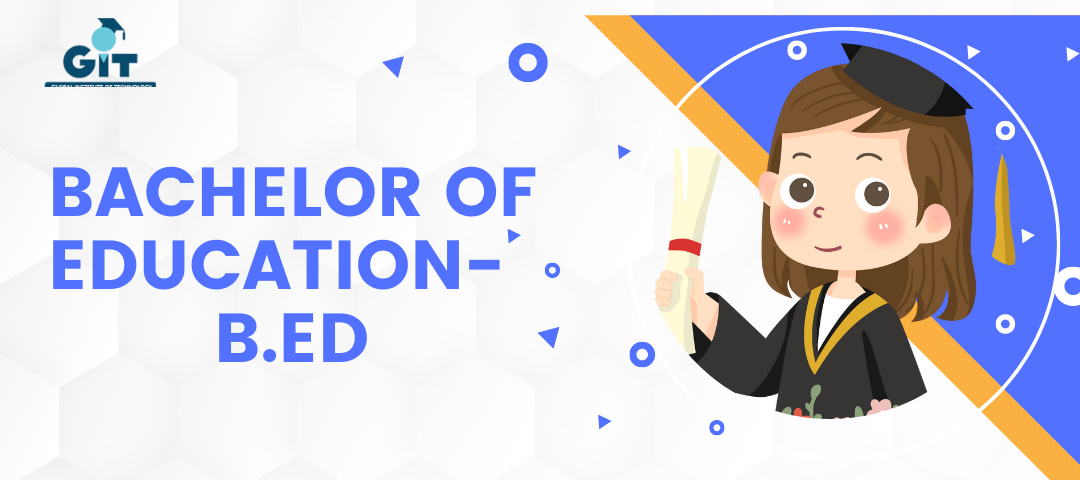
Bachelor of Education- B.Ed
B.Ed stands for Bachelor of Education, and it is an undergraduate degree program that focuses on developing the skills and knowledge needed for teaching. The duration of the B.Ed course is generally two years, and it is designed to prepare individuals for a career in teaching at the primary, secondary, or higher secondary level.
COURSE OUTCOMES
-
B.Ed stands for Bachelor of Education, and it is an undergraduate degree program that focuses on developing the skills and knowledge needed for teaching. The duration of the B.Ed course is generally two years, and it is designed to prepare individuals for a career in teaching at the primary, secondary, or higher secondary level.
Approvals Checklist




Overview of Bachelor of Education- B.Ed

B.Ed stands for Bachelor of Education, and it is an undergraduate degree program that focuses on developing the skills and knowledge needed for teaching. The duration of the B.Ed course is generally two years, and it is designed to prepare individuals for a career in teaching at the primary, secondary, or higher secondary level.
B.Ed course highlights:
Professional Training: B.Ed is a professional training course that prepares students for a career in teaching. It equips them with the knowledge and skills required to be successful teachers.
Teaching Practice: B.Ed programs generally include a teaching practice component where students get to apply what they have learned in the classroom. This experience helps them gain practical experience and develop teaching skills.
Focus on Educational Psychology: B.Ed courses emphasize the study of educational psychology, which enables students to understand the learning process and how to design effective teaching strategies that cater to individual student needs.
Curriculum Design: B.Ed programs provide students with the necessary skills to design and develop curriculum, which is an essential aspect of teaching.
Classroom Management: B.Ed courses cover classroom management skills, which are essential for maintaining discipline, fostering a positive learning environment, and engaging students.
Use of Technology: B.Ed courses incorporate the use of technology in education, which is a critical component of modern teaching. Students learn how to use technology to enhance the learning process, design multimedia teaching aids, and conduct online teaching.
Assessment and Evaluation: B.Ed courses cover the techniques and methods used to assess and evaluate student performance, which is a crucial part of teaching.
Overall, the B.Ed course highlights its focus on developing effective teaching skills, providing practical training and experience, and incorporating the latest teaching methods and technology to meet the needs of modern classrooms.
Overview of the B.Ed course curriculum:
Education and Society: This course covers the history, philosophy, and sociology of education, and how education is related to society.
Educational Psychology: This course focuses on the study of the learning process, teaching techniques, and the psychology of teaching and learning.
Curriculum and Instruction: This course covers the design, development, and implementation of curricula and instructional strategies.
Pedagogy: This course provides students with an understanding of the principles and practices of teaching, including different teaching methods and techniques.
Classroom Management: This course focuses on the skills and techniques needed to manage a classroom, including discipline, motivation, and communication.
Educational Technology: This course introduces students to the use of technology in education, including instructional design, multimedia, and e-learning.
Assessment and Evaluation: This course covers the techniques and methods used to assess and evaluate student performance.
In addition to these courses, B.Ed programs may also require students to complete a teaching internship or practice teaching experience in a real classroom setting.
Eligibility criteria for B.Ed
-
Educational Qualification: Candidates must have a bachelor's degree in any discipline from a recognized university with a minimum aggregate score of 50% (may vary from university to university). Some institutions also require specific subject combinations in the qualifying degree.
-
Age Limit: There is no specific age limit for B.Ed courses, but some universities may have an upper age limit for admission.
-
Entrance Exam: Many universities and institutions require candidates to clear a B.Ed entrance exam to be eligible for admission. The entrance exam usually consists of objective-type questions related to general knowledge, teaching aptitude, and subject-specific knowledge.
-
Reservation: Candidates belonging to specific categories such as SC, ST, OBC, PWD, or minority groups may be eligible for reservation in seats as per government norms.
It is advisable to check the eligibility criteria of the specific institution where you want to pursue a B.Ed course to ensure that you meet all the requirements before applying for admission.
Overall, the B.Ed course provides students with the theoretical and practical knowledge they need to become effective and successful teachers.
5000+
Students Enrolled
20+
Courses Offered
30+
Top Universities
10+
10 Years of experience